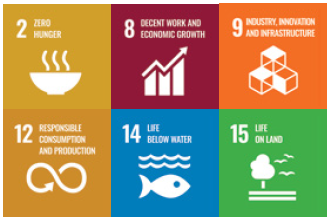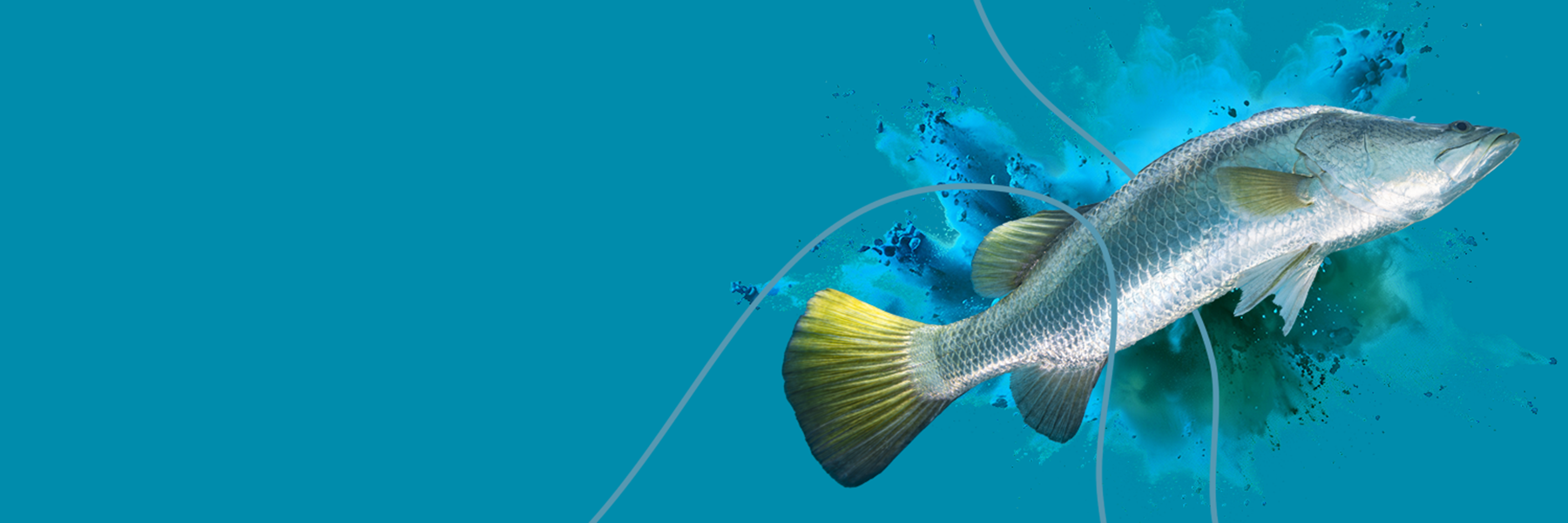Theme 1: Growing, resilient and innovative
Enduring growth and resilience to challenges through innovation
![]() Australian aquatic resources provide a rich diversity of value to the community. The fishing and aquaculture sectors provides food and nutrition security, creates products and markets, preserves and enriches culture, and creates recreational experiences and services. Global and domestic demand for aquatic foods, nature-based carbon
Australian aquatic resources provide a rich diversity of value to the community. The fishing and aquaculture sectors provides food and nutrition security, creates products and markets, preserves and enriches culture, and creates recreational experiences and services. Global and domestic demand for aquatic foods, nature-based carbon
capture solutions, cultural and recreational experiences, and novel products are projected to grow rapidly.
To support growth and resilience, people need skills, innovations and partnerships to diversify and optimise value from aquatic resources. This can include innovating or refining how we grow or catch, transforming waste into assets, diversifying experiences and products, and ensuring aquatic systems can support optimal production
and ecosystem function, including regenerative practices. Thriving sectors and sustainable practices are mutually beneficial, highlighting the importance of progressive approaches to aquatic resource use, and the role of collaboration in interconnected systems.
Ecological, social and economic instability require innovative solutions to build resilience. For all sectors, threats and opportunities such as climate change impacts, market volatility, shifts in social attitudes and the rise of advanced artificial intelligence (AI) must be met with tools and skills to build resilience and flexibility.
Across sectors, the impact of new, innovative solutions will be closely tied to economic realities. Solutions can be adopted if they are economically feasible and viable. New markets can be opened if products and services are desirable. Supporting economic prosperity facilitates greater collective resilience.
To facilitate growing, resilient and innovative fishing and aquaculture sectors, FRDC will explore opportunities to invest and collaborate on RD&E to:
- Support economic opportunities for Indigenous people
- Optimise resource benefits to grow commercial opportunities, meet global consumption demands and gain recognition as a market leader
- Support a sustainable and efficient increase in production, value and price
- Grow positive recreational fishing experiences
- Develop new, innovative products and services that respond to current and future challenges
This theme aligns with the following United Nations Sustainable Development Goals (SDGs)
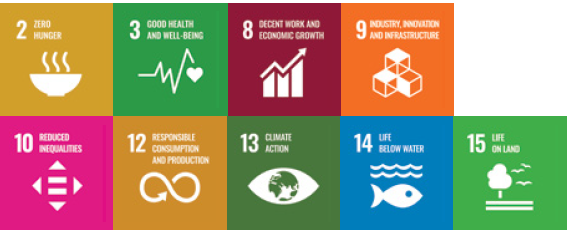
Theme 2: Best practices and production systems
Diverse economic, ecological and social benefits through best practice aquatic resource use
![]()
Responsible practices and evidence-based decision-making are essential to ensure continued access toaquatic resources, enterprise profitability and ecosystem health. Collective success can be achieved when fishing and aquaculture sectors align on shared values of viability, adaptability, equity, ethics and sustainability.
The health and wellbeing of stocks and ecosystems is foundational, and fishing and aquaculture is well positioned to lead stewardship and monitoring efforts. Effective biosecurity, healthy ecosystem function, and preparation for climate change are crucial. Best practice management arrangements and regenerative practices will sustain and grow resources for future generations.
From a commercial standpoint, it is critical that changes in practice are economically viable and contribute to overall prosperity. Good business practices and governance are fundamental to fostering a thriving economy.
Culturally, there is immense potential to learn from the traditional knowledge of Indigenous communities. Inclusive knowledge sharing offers valuable insights into improving practices while fostering deeper connections to culture and Country.
Businesses and recreational groups are increasingly required to demonstrate sustainability credentials in response to growing social concern over the safety and ethics of the products and experiences they provide. Understanding and anticipating social and governance requirements will enable Australian fishing and aquaculture to maintain and showcase their leadership and reporting using best practices.
To support economic, ecological and social benefits from best practice aquatic resource use, FRDC will explore opportunities to invest and collaborate on RD&E to:
- Meet environmental, social and governance requirements and expectations
- Respond to change, manage and reduce risks including climate change and biosecurity
- Promote learning and sharing among sectors and incorporate Indigenous knowledge
This theme aligns with the following United Nations Sustainable Development Goals (SDGs)
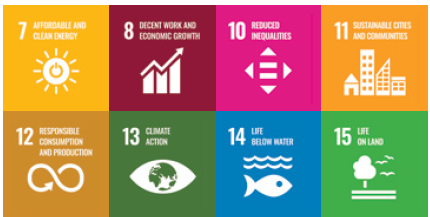
Theme 3: Capable and diverse people
Promoting diversity, growing participation, and developing skilled and adaptable people
![]() Skilled and adaptable people in production, supply chains, recreation, research and management are essential to the growth and resilience of fishing and aquaculture in Australia, especially in the face of constant change. Rising demand for products, services and experiences requires increased capacity. With ageing workforces and recreational groups, and rapid change in social expectations for work and recreational culture, there is increasing competition to attract new entrants.
Skilled and adaptable people in production, supply chains, recreation, research and management are essential to the growth and resilience of fishing and aquaculture in Australia, especially in the face of constant change. Rising demand for products, services and experiences requires increased capacity. With ageing workforces and recreational groups, and rapid change in social expectations for work and recreational culture, there is increasing competition to attract new entrants.
Attracting and retaining people of all ages, genders, backgrounds and abilities is key to driving innovation, flexibility, creativity and adaptability. Understanding and addressing factors that impact positive cultural change, and ensuring that work and recreation is physically and mentally safe, will attract talent and diversity.
Offering opportunities for learning, leadership and connection is essential to building the capability needed to expand capacity and manage change.
To promote diversity, grow participation, and develop skilled and adaptable people for fishing and aquaculture, FRDC will explore opportunities to invest and collaborate on RD&E to:
- Understand and address factors impacting positive cultural and behavioural change
- Enjoy physical and mental safety and wellbeing
- Attract and include a diversity of people
- Grow skills, creativity, collaboration and entrepreneurship
This theme aligns with the following United Nations Sustainable Development Goals (SDGs)
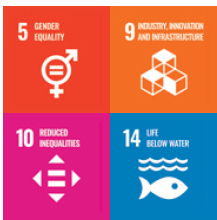
Theme 4: Secure access and resource allocation
Fair and integrated management of aquatic resources, providing certainty and confidence
![]() Access to aquatic resources, guided by good management and science, is fundamental for the continued delivery of economic and social benefits such as food and nutrition, income, employment, recreation and cultural identity for all Australians. The need for coordinated, adaptive management has been undermined by climate change, as aquatic species and habitats shift their ranges, often crossing jurisdictional borders.
Access to aquatic resources, guided by good management and science, is fundamental for the continued delivery of economic and social benefits such as food and nutrition, income, employment, recreation and cultural identity for all Australians. The need for coordinated, adaptive management has been undermined by climate change, as aquatic species and habitats shift their ranges, often crossing jurisdictional borders.
Growing populations and a changing climate have intensified competition for resource allocation. Planning, management decisions and uncertainty have profound impacts on people, culture, the environment and the economy. To maximise benefits for the Australian community, planning and management decisions should be informed by evidence-based science and research.
Clear evidence of the economic, environmental and workforce contributions of fishing and aquaculture and the demonstration of environmental, social and governance contexts is essential. It is equally important to showcase the broader benefits that fishing and aquaculture offer the community, including cultural identity, mental and physical wellbeing, nutritious food and attractive commercial products and experiences.
To ensure fair and integrated management of aquatic resources, FRDC will explore opportunities to invest and collaborate on RD&E to:
- Support integrated and effective management of and access to, aquatic resources underpinned by evidence-based decisions
- Share and obtain data easily and securely
- Enable operations in shared multi-use spaces
- Support future-fit management in emerging fisheries and aquaculture
This theme aligns with the following United Nations Sustainable Development Goals (SDGs)
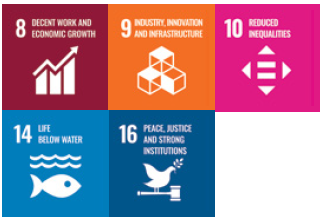
Theme 5: Community trust, acceptance and value
People share, use and feel positive about fishing and aquaculture's products, services and experiences
![]() Community support is essential for the maintenance and growth of Australia’s fishing and aquaculture sectors. As social values and consumer demands rapidly evolve, they increasingly influence planning, practices, markets and decision-making. Demonstrating alignment with community values and delivering mutual benefits is key to maintaining social license to operate, and building increased value and use of products, services and experiences offered by the fishing and aquaculture sectors.
Community support is essential for the maintenance and growth of Australia’s fishing and aquaculture sectors. As social values and consumer demands rapidly evolve, they increasingly influence planning, practices, markets and decision-making. Demonstrating alignment with community values and delivering mutual benefits is key to maintaining social license to operate, and building increased value and use of products, services and experiences offered by the fishing and aquaculture sectors.
Understanding perceptions of commercial and recreational fishing impacts is crucial for community support and acceptance. Similarly, knowing the drivers of trust helps identify where meaningful changes can be made, and how to communicate. Trust in Australian fishing and aquaculture is closely linked to environmental responsibility, animal welfare, innovation and fair distribution of benefits. However, these drivers shift over time, requiring ongoing monitoring and adaptation.
Indigenous, recreational and commercial wild catch fishers and aquaculturalists need tools and skills to respond effectively to community signals while minimising disruption. Clear communication of positive actions is equally important to ensure understanding and impact. Building trust and acceptance allows communities to embrace and celebrate the products, services and experiences offered by Australian fishing and aquaculture.
To ensure that people share, use and feel positive about fishing and aquaculture’s products, services and experiences, FRDC will explore opportunities to invest and collaborate on RD&E to:
- Build and maintain trust, acceptance and value
- Understand the drivers of community and consumer perception
- Develop tools to build trust, value and acceptance
This theme aligns with the following United Nations Sustainable Development Goals (SDGs)
